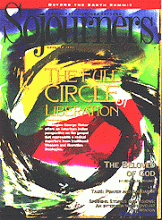Theologian George Tinker claims indigenous traditions and spirituality as the true roots of his American Indian theology of liberation. These traditions are based on an understanding of existence radically different from that of traditional Western and liberation theologies. Tinker calls for respect for distinct indigenous spiritualities and cultures, and also for allowing these perspectives to critique Western approaches to theology.
Tinker was assistant professor of cross-cultural ministries at Iliff School of Theology in Denver, Colorado, and associate pastor of Living Waters, a joint Episcopal-Lutheran Indian parish, when this article appeared. This article is adapted from a speech he delivered to the Ecumenical Association of Third World Theologians meeting in Nairobi, Kenya, in January 1992. - The Editors
This is a challenge to hear the voices of indigenous peoples.
We make up a Fourth World, if you will, oppressed both by the powerful nations and by the so-called developing nations. As Fourth World peoples we share with our Third World relatives the hunger, poverty, and repression that have been the continuing common experience of those overpowered by the expansionism of European adventurers and their missionaries 500 years ago.
What distinguishes Fourth World indigenous peoples from Third World peoples, however, are deeper, more hidden, but no less deadly effects of colonialism that impact our distinct cultures in dramatically different ways. These effects are especially felt in the indigenous spiritual experience, and our struggle for liberation is within the context of this distinctive spirituality.
Read the Full Article

